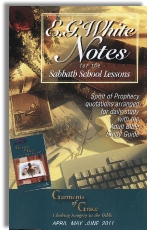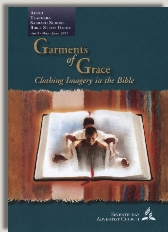|
||||||||||||||
Commentary on "More Clothing Imagery"
Day 4: Tuesday, June 14, 2011 - "Nor Rend His Clothes"
OVERVIEW
Today's lesson revolves around Lev. 21:10. Follow-up reading is Matthew 26:59-68, along with Mark 15:38 and Hebrews 8:1. "What can we read into the high priests rending (tearing or ripping) of his garments in response to Christ's answer to him?"
OBSERVATIONS
According to rabbinic sources, once the priest has heard blasphemy—a capital offense—he is to stand and tear his clothes. The author's comment regarding the irony of Caiaphas' actions was well put. "To tear these robes would be to profane God's character. Thus, the irony was that Caiaphas was guilty of breaking the very law he defended. It made him unfit for his office. More sobering than that, the penalty for tearing his garments was death. The great irony in all this was that Jesus, who had done nothing wrong, was to be put to death at the instigation of the very priest who, through his actions, deserved death himself." I'd like to add that Caiaphas was deserving of death—as we all are, hopeless sinners—before he ever ripped his clothes.
The symbolism of that rending was profound, indeed. The lesson points out that this tearing of the priestly garment was the "beginning of the end of the entire earthly sacrificial system and priesthood. A new and better one was soon to be inaugurated, with Christ as the new high priest ministering in the sanctuary in heaven."
"He made the One who did not know sin to be sin for us, so that we might become the righteousness of God in Him." (2 Cor. 5:21)
Just to clarify, this was the beginning of the end, but not to start up a new "phase" of priestly duties, as the Investigative Judgment doctrine states. The Bible doesn't support this S.D.A. theory/doctrine. Instead, when Jesus died on the cross, the earthly priestly duties were then devoid of all meaning (as symbolized in Mark 15:38, the sanctuary curtain tearing at the time of Jesus' death). The sacrificial system in the sanctuary was superseded by the ultimate sacrifice of Jesus' death on the cross.
"For Christ also suffered for sins once for all, the righteous for the unrighteous, that He might bring you to God, after being put to death in the fleshly realm but made alive in the spiritual realm." (1 Peter 3:18).
"Since the law has only a shadow of the good things to come, and not the actual form of those realities, it can never perfect the worshipers by the same sacrifices they continually offer year after year….Now every priest stands day after day ministering and offering time after time the same sacrifices, which can never take away sins. But this man, after offering one sacrifice for sins forever, sat down at the right hand of God. He is now waiting until His enemies are made His footstool. For by one offering He has perfected forever those who are sanctified. The Holy Spirit also testifies to us about this. For after He had said: 'This is the covenant that I will make with them after those days, says the Lord: I will put My laws on their hearts, and I will write them on their minds.' He adds: 'I will never again remember their sins and their lawless acts.' Now where there is forgiveness of these, there is no longer an offering for sin." (Hebrews 10:1, 11-18).
His death paid in full our debt of sin, as it was cancelled out by Jesus. Period. No scriptural gymnastics. No transferring of Jesus from one sanctuary compartment to another in 1844. No reviewing of names, never knowing when YOUR name will come up and wondering if you have any unconfessed sins that might keep you out of heaven. Jesus, as our High Priest, sat down (past tense) at the right hand of the throne of the Majesty in the heavens. Past tense implies that it's finished, a done deal,—not in the middle of a reviewing process, as per the Investigative Judgment. The Bible tells us:
"I assure you: Anyone who hears My word and believes Him who sent Me has eternal and will not come under judgment but has passed from death to life." (John 5:24)
"For all have sinned and fall short of the glory of God. They are justified freely by His grace through the redemption that is in Christ Jesus. God presented Him as a propitiation through faith in His blood, to demonstrate His righteousness, because in His restraint God passed over the sins previously committed. He presented Him to demonstrate His righteousness at the present time, so that He would be righteous and declare righteous the one who has faith in Jesus." (Romans 3:23-26)
The final question posed to the readers is: "In what ways could we be so caught up in our own sense of self-righteousness, our own sense of moral and spiritual superiority, that we could be blind to the important truths that the Lord wants us to learn?" Adventist theology (vs. pure biblical truth) seems to foster moral superiority in two ways: 1) Behavioral emphasis. Adventist theology is largely about following Christ's example; looking good on the outside specifically, rather than relying on the Holy Spirit's indwelling to change us from the inside out, and doing His work in our life through continual sanctification. If it's about constantly trying to "do better" and aspiring to perfection (as per E. G. White's doctrine), then we will always come up short and fail miserably. We can't do it on our own, which is why we need a Savior in the first place.
"For while we were still helpless, at the appointed moment, Christ died for the ungodly." (Rom. 5:5)
"I greatly rejoice in the Lord, I exult in my God; for He has clothed me with the garments of salvation and wrapped me in a robe of righteousness, as a bridegroom wears a turban and as a bride adorns herself with her jewels." (Isaiah 61:10)
It seems, as humans, the better we act and the more spiritual we appear, the more we harbor pride in our own merits and abilities. 2) The Sabbath. Much of the Adventist's special theology is wrapped up in their special day. We all need to avoid feeling spiritually superior as it only results in spiritual pride. We only come to Christ as the Holy Spirit draws us to Him, it's never of ourselves.
"He said, 'That is why I told you that no one can come to Me unless it is granted to him by the Father.'" (John 6:65)
We're all charity cases, as it were. Adventists believe that they worship on the true day. Their primary focus is really on the Sabbath rather than on Jesus. Jesus is important, BUT the "end time trouble", the "seal of the believer" (which biblically is the Holy Spirit, Eph. 1:13, 14) and the ultimate end-time testing all boil down to what day they worship on, not WHO they're worshipping—it sounds like the Sabbath has become some kind of a god that has taken an inordinate amount of importance away from our Savior, Jesus Christ, who gave His life for us on the cross? The gospel is about Jesus, not the Sabbath. There is much pride in "keeping" the Sabbath. Unless they're keeping ALL of the law (like orthodox Jews, and are under the law, not the grace of Jesus Christ) then they aren't keeping anything. It's a mind game. Just because you sit in church on Saturday instead of Sunday does not make you a "Sabbath-keeper" (any more than going to church on Sunday means you're a Sun worshiper, or going to church on Saturday makes you a Saturn worshiper). Making up one's own rules about what's OK to do on the Sabbath and what isn’t OK to do, doesn't mean you're keeping the Sabbath, either. The Bible tells us:
"For whoever keeps the entire law, yet fails in one point, is guilty of breaking it all." (James 2:10)
If you're under the law, and have broken any of it, you’re under judgment. When the Israelites were under the law, God wasn't lax in giving them mercy for good intentions. If you broke the law, you paid the penalty. That's why Christ came. He made null and void the law so we could be under His grace.
"For Christ is the end of the law for righteousness to everyone who believes." (Romans 10:4)
"But now we have been released from the law, since we have died to what held us, so that we may serve in the new way of the Spirit and not in the old letter of the law." (Romans 7:6)
"For sin will not rule over you, because you are not under law but under grace." (Romans 6:14)
All we have to do is believe, through faith. Not works. Not Sabbath-keeping. We're all equally deserving of wrath, except through Christ's sacrifice for us, no matter what day of the week we worship on. It's not about the day, but about the Person of Jesus Christ and Him crucified. No perks for being a special denomination. We're all in the same boat and all need to be clothed in His righteousness in the same way. We're all "equal opportunity sinners". When we come to the realization that we truly are hopeless sinners, we can then admit that we're all in the same situation with our need of salvation, no matter what day we attend church.
It's all about Jesus. When we're in a right relationship with Him and our eyes are focused upward, we can glorify our Creator and Redeemer, not ourselves. (Rom. 12:3). Jesus is superior, not us.
CONCLUSIONS
- The priest tore his clothes because he didn't recognize truth and thought Jesus' claim was blasphemy.
- It was ironic that Caiaphas was guilty of breaking the very law that he thought he was defending. He was spiritually blind.
- The rending was symbolic: Jesus' death would make the earthly law obsolete.
- Jesus' sacrifice on the cross completed the payment for our sins, once and for all (1 Peter 3:18).
- The Investigative Judgment (an Adventist doctrine) is unscriptural. Jesus completed the payment for our sins and we have passed over from death to life and will not come under judgment (John 5:24).
- Adventist theology fosters self-righteousness and spiritual superiority because it relies heavily on good works and pseudo Sabbath-keeping as it relates to/contributes to their salvation.
- If you're under the law, and not grace, you must not fail in any area. If you do, you've failed at the whole thing and come under judgment (James 2:10).
- As believers, we're sealed by the Holy Spirit (Eph. 1:13, 14), not our adherence to Sabbath-keeping as Adventist theology teaches.
- It's all about Jesus Christ. When we're in right relationship to Him and have our eyes focused upward, we realize that Jesus is superior, not us.
(Emphasis supplied in all passages.)
Copyright 2011 BibleStudiesForAdventists.com. All rights reserved. Revised June 11, 2011. This website is published by Life Assurance Ministries, Glendale, Arizona, USA, the publisher of Proclamation! Magazine. Contact email: BibleStudiesForAdventists@gmail.com.
The Sabbath School Bible Study Guide and the corresponding E.G. White Notes are published by Pacific Press Publishing Association, which is owned and operated by the Seventh-day Adventist church. The current quarter's editions are pictured above.
Official Adventist Resources
Standard Edition Study Guide Week 12
Teacher's Edition Study Guide Week 12
Easy Reading Edition Study Guide Wk 12
Search the Complete Published Ellen G. White Writings
Please Support This Project


